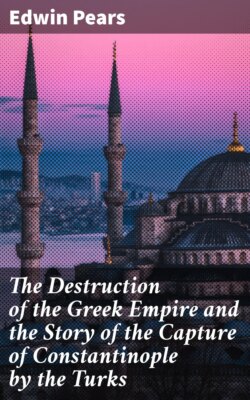The Destruction of the Greek Empire and the Story of the Capture of Constantinople by the Turks

Реклама. ООО «ЛитРес», ИНН: 7719571260.
Оглавление
Edwin Pears. The Destruction of the Greek Empire and the Story of the Capture of Constantinople by the Turks
The Destruction of the Greek Empire and the Story of the Capture of Constantinople by the Turks
Table of Contents
PREFACE
ILLUSTRATIONS
MAPS
CHAPTER I
CHAPTER II
CHAPTER III
CHAPTER IV
CHAPTER V
CHAPTER VI
CHAPTER VII
CHAPTER VIII
CHAPTER IX
CHAPTER X
CHAPTER XI
CHAPTER XII. THE SIEGE
CHAPTER XIII
CHAPTER XIV
CHAPTER XV
CHAPTER XVI
CHAPTER XVII
CHAPTER XVIII
CHAPTER XIX
CHAPTER XX
APPENDICES. APPENDIX I
APPENDIX II
APPENDIX III
APPENDIX IV
Footnote
INDEX
Отрывок из книги
Edwin Pears
Published by Good Press, 2022
.....
I admit that when Charles the Great, in 800, became Roman Emperor in the West the imperial territory of which the capital was Constantinople may correctly be spoken of as the Eastern Roman Empire. But I avoid condemnation for not adopting this name and for not calling the empire Roman by pleading that I am reverting to the practice of our fathers in the West during many centuries, and by defending their practice. The Empire has sometimes been described as Byzantine and sometimes as the Lower Empire. But these names are undesirable, because the first has a vague and doubtful meaning, since no two writers who employ it use it to cover the same period; and the second has a derogatory signification which the researches of Freeman and Professor Bury, Krumbacher, Schlumberger, and other modern writers, have shown to be undeserved. The name ‘Roman’ has more to recommend it. The Persians and the Arabs knew the empire simply as Roman, and the overwhelming reputation of Rome led them to speak even of Alexander the Great as ‘Iskender al Roumy.’ The name of Rome, or Roum, given to Roumelia, and found in other places as far east as Erzeroum, had been applied when the Latin element dominated the empire. The tradition of Rome passed on to the Turks, and the inhabitants of the empire were and are to them I-roum or Romans. The Byzantine writers usually called themselves Romans. But the term Roman can hardly be applied to the empire without distinguishing it as Eastern, and while it is true that down to 1453 the empire was Roman in name, there is some danger in employing the term of forgetting how far the New Rome and its territory had become Hellenised, and that a large portion of the population preferred the name Greek. There had been a long struggle within the empire itself between those who wished to adopt the latter designation and those who desired to call it Roman. The inhabitants of Greece were indeed for centuries preceding and during the Crusades disloyal subjects of Constantinople. Even during the reign of Heraclius (610 to 641), they insisted upon being called Hellenes rather than Romans. From that time onwards a contest was continued as to whether the name of Greek or Roman should be applied to the population. The influence of the Greeks henceforth was constantly working to Hellenise the empire. In the reign of Irene, at the time when the Western Roman Empire commenced to have a separate existence, Greek influence was especially strong. Lascaris, four centuries later, when he made his stand at Nicaea after the Latin conquest, spoke of the empire as that of Hellas. On the recovery of the city under Michael, the Church generally employed the term Roman, but declared that Greek and Roman might be employed indifferently. Various writers speak of the Latins as Romans and of the Byzantines as Hellenes.11 Manuel Bryennius represents the preacher in St. Sophia as calling upon his hearers to remember their Greek ancestors and to defend their country as they had done. At times the people were appealed to as the descendants alike of Greeks and Romans.
As being a continuation of the Roman Empire whose capital was New Rome, the empire is correctly called Roman, and the name has the advantage of always keeping in view the continuity of Roman history. It was the Eastern Roman Empire which declined and fell in 1453. But if we admit that the empire continued to be Roman till 1453, it must be remembered, not only that its characteristics had considerably changed, but that to the men of the West it had come to be known as the Greek Empire. Latin had been as completely forgotten as Norman French was by English nobles in the time of Edward III. Greek had become the official language, as did English in our own country. The inscriptions on the coins since the time of Heraclius are in Greek. The Orthodox Church, which aided as much as even law in binding the inhabitants of the country together, employed Greek, and Greek almost exclusively, as its language, and, although the great defenders of the term Roman as applied to the population are found among its dignitaries, the Church was essentially Greek as opposed to Roman, both in the character of its thought and teaching and in the language it employed. Hence it is not surprising that to the West during all the middle ages, the Empire was the Greek Empire, just as the Orthodox Church was the Greek Church.12 The Empire and the Church were each alike called Greek to distinguish them from the Empire and Church of the West. It is in this general use of the word Greek that I find my justification for speaking of the capture of Constantinople, and the events connected with it, as the Destruction of the Greek Empire.13
.....